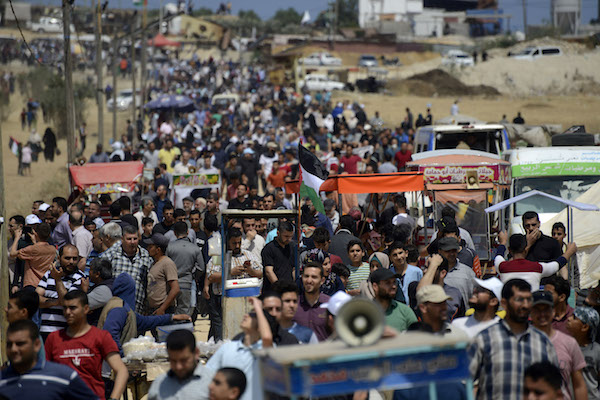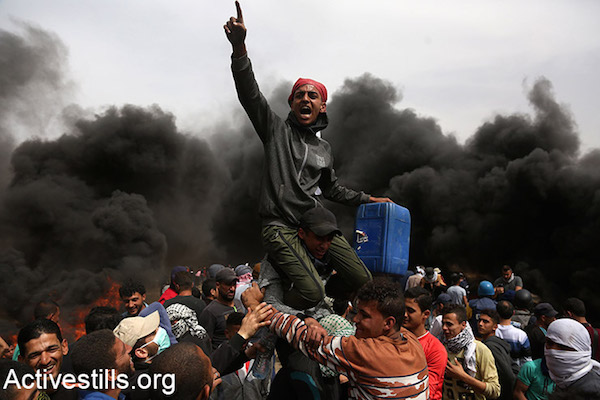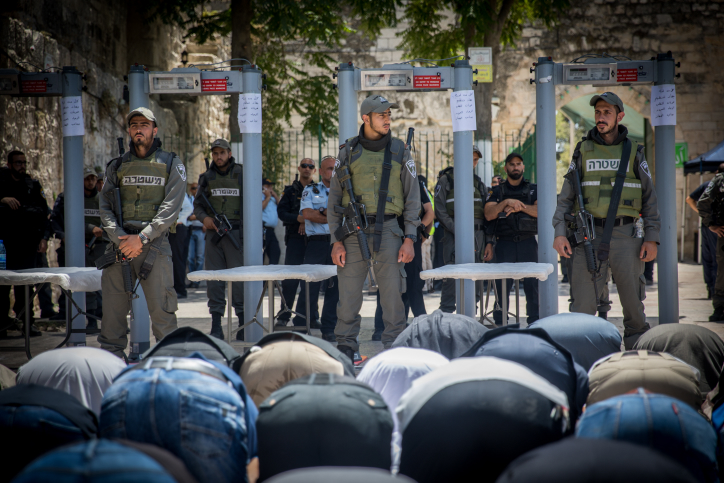The Great Return March has the potential to lend its momentum to grassroots and popular struggles beyond Gaza’s fence, in the West Bank, Jerusalem, and inside Israel.
By Awad Abdelfattah

It is still premature to predict the fate of the Great March of Return, which is the brainchild of primarily young activists who managed, with great success, to involve the entire political spectrum in the Gaza Strip in an unarmed civil resistance. The march is being viewed by many as a remarkable and exceptional development that, if sustained, could open a new horizon politically and strategically for the Palestinians — as well as for Israelis who are critical of Israel’s oppressive apartheid — to launch a serious campaign for an alternative vision and path of struggle.
Two main factors make this astonishing mobilization near Gaza’s apartheid fence distinctive. The first is the rise of young vanguards to motivate the entire Palestinian political polity to fully engage in this civil activity. For over a year, I have followed the writings of one of the young, leading figures of the movement, Ahmad Abu Rtema; he too has followed my writings. We chatted several times before he, along with his partners, helped to turn the idea of the march into action. It was clear that Ahmad represented a new and creative thinking among the young generation, and was eager to continue learning. What further attracted me was his civil discourse towards the Israeli public: his support for a single democratic state in historic Palestine – where Palestinian Arabs, including refugees, and Israeli Jews can live together as equals – is a part of his political convictions.
The second factor is the endorsement of the Return March by Hamas and other factions in Gaza. This indicates a shift in these organizations’ political thinking, which could resonate across Palestinian society and around the world. Hamas’ immediate support of the idea of the march was partly motivated by the severe humanitarian and political crises facing the movement and the entire population of Gaza. These include growing internal tensions and external pressures, aggravated by relentless Israeli aggression, the antagonism of Western governments and Arab regimes, and the latest sanctions imposed by the president of the Palestinian Authority, Mahmoud Abbas, which have added insult to injury.

Indeed, in recent years, Hamas has been trying, without real success, to reform its political platform and discourse to make it more acceptable to the international community, and has cited its support for popular struggle on numerous occasions. The movement’s backing of the Return March is in line with this intention. However, the party which has the most interest in thwarting such a change is Israel, which wants to maintain Hamas’ image as a terrorist organization, and Abbas’ image as an objector to negotiations. The execution of Palestinian marchers along the Gaza fence also reflects Israel’s frustration with this type of struggle, because it cannot cope with its moral and nonviolent nature. This is further shown by Israel’s admittance that it lost the media war over Gaza these past few weeks.
Since it is not interested in starting a fourth war with Hamas, particularly due to the situation on the northern border with Syria, Israel may opt to silence the civil resistance in Gaza through an agreement that would temporarily ease the humanitarian crisis, without offering any major political or structural changes. The news about Israeli efforts to achieve such a short-term agreement worries the organizers of the march, because it could undermine their most important strategic political objectives: the full removal of the blockade of Gaza, and the growing momentum for the Palestinians’ right to return.
Two signs of hope
Amidst these difficult realities, two developments have emerged in recent years that offer important signs of hope. The first is the growing voices among Palestinians and allies working outside traditional factional structures who, like Ahmad, are calling for a single democratic state in historic Palestine as an alternative to partition, apartheid, and colonialism. These voices include prominent Palestinian and Jewish Israeli intellectuals, academics, activists, and organizations.
The second is the renewal of the Palestinian popular struggle, and the growing conviction among Palestinians that this method of resistance must be widely promoted and prioritized by all factions and movements. Although popular resistance and civil disobedience have always been integral to the Palestinian struggle (and have always faced suppression at the hands of Israel’s military force), over the last six years, Palestinians in Jerusalem and its neighboring villages, as well as other places in the West Bank, have witnessed small but notable “intifadas.” The most inspiring of these was the 11-day intifada against the metal detectors at the Haram al-Sharif (Temple Mount), which achieved its specific goal of removing the electronic devices from the area.

How should we interpret and react to these two promising developments? The challenge, I believe, is to connect and utilize these developments as a catalyst and inspiration for building sustainable co-resistance, guided by a common vision: a united, democratic alternative to the existing apartheid regime. Given the demise of the two-state solution – which I believe is an unjust and racist proposal – we are finding ourselves in a historic phase where both the vision and the means to achieve an alternative future have become impervious to slander and defamation, and have become effective in rallying public opinion because of their morality and inclusivity.
How and where do we start?
Even if Israel manages to stifle the Return March, or other states or parties manage to block its strategic goals, popular resistance should continue to be embraced as a key strategy of resistance – not only in Gaza, but in Jerusalem, the West Bank, in refugee camps in Arab countries, and inside Israel. For that objective to materialize, a clear and well-planned strategy of grassroots struggle, composed of different phases, is required. The shift by all Palestinian factions to unarmed resistance, in the style of the First Intifada, also offers opportunities not only for all Palestinians to partake in the struggle, but also for Israelis who fight against apartheid.
Earlier this year, some 20 Palestinians and Israelis met in Haifa and decided to start the ‘One Democratic State Campaign’ (ODSc). The number of supporters – intellectuals, academics, activists, and others – who have joined so far, within a short period of time, is far greater than we had hoped, showing that the time is ripe for such an initiative. Our mission is to engage in an organized framework to create an alternative political consciousness, which entails a moral obligation to fight injustices, colonization, racist separation, and all forms of oppression.
This movement can begin with Palestinians and progressive Israelis inside the Green Line, while networking and coordinating with interested groups in the occupied territories and in the diaspora. However, for this joint struggle to succeed, this progressive coalition must be transformed into a mass grassroots movement with wide public support. It is a long walk to liberation, freedom, equality, and social justice – and it is not an easy walk. But we believe that it is the only way to promote life, instead of more death and destruction.
Awad Abdel Fattah is a former head of the Balad Party and a co-founder of the One Democratic State Campaign (ODSc).
